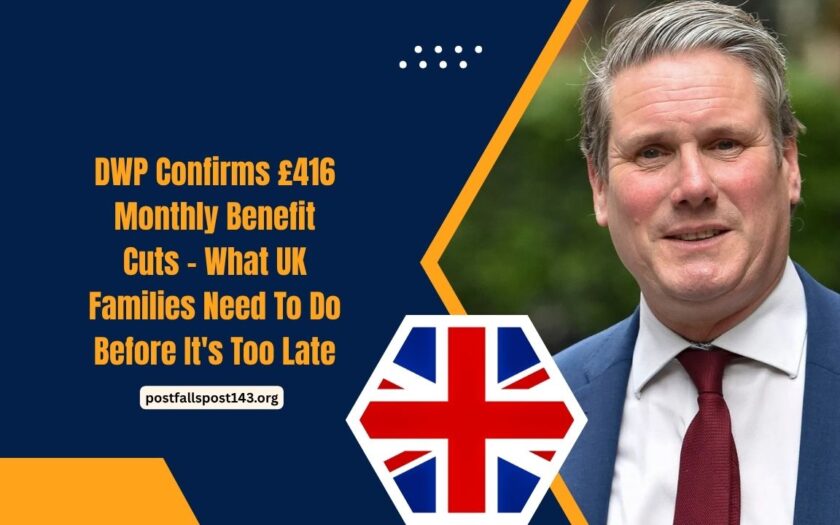In a controversial move, the Department for Work and Pensions (DWP) has officially confirmed monthly benefit cuts of up to £416, sending shockwaves through UK households.
These changes, set as part of sweeping welfare reforms, are aimed at cutting public spending and reshaping the benefits system.
However, for over 450,000 families, the announcement brings uncertainty, anxiety, and a looming financial crunch.
Why Are Benefits Being Cut?
The government cites unsustainable welfare spending as the driving force behind these cuts. Over the past five years, incapacity-related benefits alone have surged from £52 billion to £65 billion. Officials argue that current welfare policies:
- Disincentivise employment
- Leave the system open to fraud and overpayments
- Require reform to balance the national budget
Yet, advocacy groups say this approach ignores the realities faced by claimants—especially those battling illness, caring responsibilities, or living in regions with limited job access.
Who Will Be Affected?
While these changes are not across the board, several groups are at high risk of experiencing a significant drop in monthly income:
Groups Most Impacted by DWP Cuts
| Affected Group | Potential Loss Per Month |
|---|---|
| Universal Credit (WCA) claimants | Up to £416 |
| ESA recipients (with work capacity) | £300 – £400 |
| Single-parent families | £250 – £350 |
| Individuals near retirement age | £200 – £350 |
The Work Capability Assessment (WCA) review plays a major role in determining whether a recipient will see cuts. Families relying on benefits to cover rent, food, and childcare are already feeling the financial strain.
Who Is Exempt?
Some individuals are shielded from the full impact of these cuts. These include:
- People with severe or terminal disabilities
- Parents of children with complex medical or developmental needs
- Claimants facing extreme hardship
If you think you may qualify for an exemption, contact the DWP or your local council for a case review.
Real-Life Impact: Stories from the Ground
For many, this isn’t just policy—it’s survival.
Mary, a single mother in Birmingham, saw her Universal Credit slashed by £300. Despite searching for work, childcare costs leave her trapped in a cycle of late rent and mounting bills.
David, a disabled veteran from Manchester, fears his £416 cut will force him to depend on food banks, threatening the independence he fought to maintain.
These cases highlight how policy decisions trickle down to affect everyday lives in powerful, painful ways.
What Can You Do If You’re Affected?
If you’ve received a notice of reduced benefits, take action immediately:
- Mandatory Reconsideration – File a request within 30 days for DWP to re-evaluate their decision.
- Appeal to Tribunal – An independent panel can overturn DWP rulings.
- Get Free Help – Organisations like Citizens Advice, Scope, and Turn2Us can assist with applications, appeals, and more.
Additional Support Options Available
If your primary benefits have been cut, you may still qualify for alternative support, such as:
- Emergency Council Support – Help with food, rent, and energy bills
- Household Support Fund – Available via your local authority
- Food Banks – Services like The Trussell Trust provide essential supplies
- Debt Advice – StepChange and National Debtline offer financial planning help
Coping and Budgeting Tips
When money is tight, small changes can make a big difference:
- Prioritise essentials – Focus on housing, food, and utility bills
- Track your spending – Identify non-essential costs to reduce
- Use comparison sites – Lower bills by switching providers
- Explore part-time work – Flexible, remote options can supplement income
- Look for grants – Some councils and charities offer emergency funds
What This Could Mean Long-Term
If the £416 monthly cuts stay in place, experts predict:
- A rise in poverty levels, especially among working-age disabled people
- Overwhelmed public services like housing, healthcare, and mental health support
- Increased demand on food banks and charity organisations
- Political repercussions, as public backlash grows toward austerity policies
The DWP’s confirmation of £416 monthly benefit cuts marks a defining moment in the UK’s welfare policy.
While intended to cut costs, the move places immense pressure on vulnerable families already stretched thin. If you’re affected, seek help now—support and appeal mechanisms are available, but timing is critical.
FAQs
Who is most at risk of losing up to £416 per month?
Universal Credit claimants under Work Capability Assessments, ESA recipients, single-parent families, and individuals nearing retirement age.
Can I appeal a benefit cut decision?
Yes. You can request a Mandatory Reconsideration within 30 days and escalate to a Tribunal if needed.
Are there any exemptions from these cuts?
Yes. Those with severe disabilities, terminal illnesses, or children with complex needs may be partially or fully exempt.
